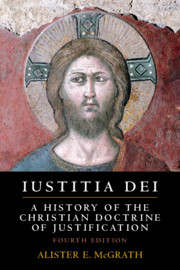Book contents
- Iustitia Dei
- Iustitia Dei
- Copyright page
- Contents
- Tables
- Preface to the Fourth Edition
- Abbreviations
- Introduction
- Part I Justification
- Part II The Middle Ages
- 4 The Nature of Justification
- 5 The Righteousness of God
- 6 The Concept of Grace
- 7 The Human Appropriation of Justification
- 8 Justification and the Two Powers of God
- 9 The Concept of Merit
- 10 Justification and the Sacraments
- Part III Protestantism
- Part IV Catholicism
- Part V The Modern Period
- Conclusion
- A Brief Glossary of Medieval Soteriological Terms
- Works Consulted
- Index
4 - The Nature of Justification
from Part II - The Middle Ages
Published online by Cambridge University Press: 27 January 2020
- Iustitia Dei
- Iustitia Dei
- Copyright page
- Contents
- Tables
- Preface to the Fourth Edition
- Abbreviations
- Introduction
- Part I Justification
- Part II The Middle Ages
- 4 The Nature of Justification
- 5 The Righteousness of God
- 6 The Concept of Grace
- 7 The Human Appropriation of Justification
- 8 Justification and the Two Powers of God
- 9 The Concept of Merit
- 10 Justification and the Sacraments
- Part III Protestantism
- Part IV Catholicism
- Part V The Modern Period
- Conclusion
- A Brief Glossary of Medieval Soteriological Terms
- Works Consulted
- Index
Summary
The second part of this work consists of seven chapters exploring the development of the doctrine of justification in the Middle Ages, set against the backdrop of the discussion of theological method during this important and extended period. This chapter focusses on the medieval understandings of the nature of justification, in which the views of Augustine on the nature of justification as a ‘making righteous’ of the believer is amplified and elaborated. Of particular importance here is the medieval exploration of the inner dynamics of justification, framed in terms of the Processus Iustificationis (‘process of justification’), which correlates the various elements of the transformation of the believer, including ontological and relational issues. Particular attention is paid to the discussion of this theme in the early medieval theological tradition, focussing especially on the early Dominican and Franciscan schools.
- Type
- Chapter
- Information
- Iustitia DeiA History of the Christian Doctrine of Justification, pp. 67 - 81Publisher: Cambridge University PressPrint publication year: 2020

